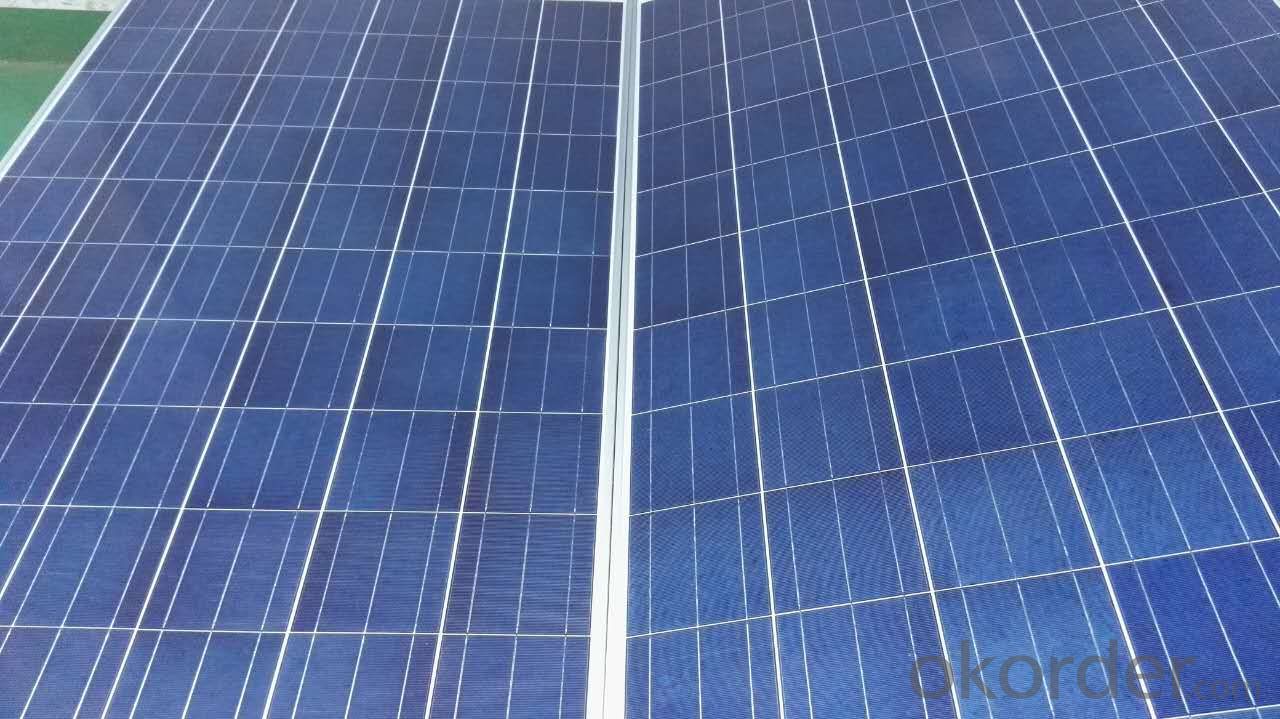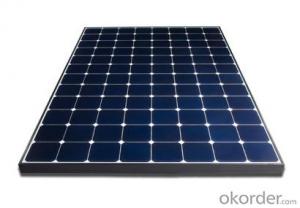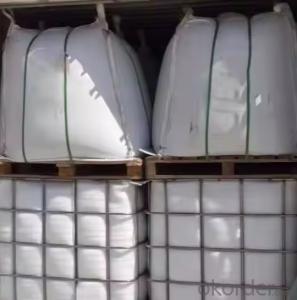CNBM Poly 1000W Off Grid Solar Sytem with 10 Years Warranty
- Loading Port:
- Shanghai
- Payment Terms:
- TT OR LC
- Min Order Qty:
- 100 watt
- Supply Capability:
- 1000 watt/month
OKorder Service Pledge
OKorder Financial Service
You Might Also Like
Item specifice
CNBM Poly 1000W Off Grid Solar Sytem with 10 Years Warranty
Product description
Off-the-grid is a system and lifestyle[1] designed to help people function without the support of remote infrastructure, such as anelectrical grid. In electricity, off-grid can be stand-alone power system or mini-grids typically to provide a smaller community with electricity. Off-grid electrification is an approach to access electricity used in countries and areas with little access to electricity, due to scattered or distant population. The term off-the-grid (OTG) can refer to living in a self-sufficient manner without reliance on one or more public utilities. People who adopt this lifestyle are called off-gridders.[2]
The photovoltaic off-grid market has been researched by international institutes, universities and market research companies. The cumulative installed PV capacity is estimated in 2010 between 1 and 2 GW[16] depending on the source. The market research company Infinergia has gone further by mapping national cumulative installed off-grid PV capacity on 100 countries worldwide.[
Application
Residential
Commercial
Industrial
Feature
Off-the-grid homes are autonomous; they do not rely on municipal water supply, sewer, natural gas, electrical power grid, or similar utility services. A true off-grid house is able to operate completely independently of all traditional public utility services. The idea has been recently popularized by certain celebrities including Ed Begley, Jr.[3] who stars in the Living with Ed[4] television show on the Home & Garden Television (HGTV) network. Actress Daryl Hannah promotes off-grid living and constructed her home in Colorado according to those principles, as does survival expert and Dual Survival co-star Cody Lundin,[5] who lives in a self-designed, passive solar earth house in the high-desert wilderness of Northern Arizona, collecting rainwater, composting waste, and paying nothing for utilities.[6][7]
Packaging
With carton and box
- Q:What are the different types of solar panels used in solar energy systems?
- The different types of solar panels used in solar energy systems include monocrystalline, polycrystalline, thin-film, and bifacial panels. Monocrystalline panels are made from a single crystal structure, providing high efficiency but at a higher cost. Polycrystalline panels are made from multiple crystal structures, offering slightly lower efficiency but at a more affordable price. Thin-film panels are made by depositing a thin layer of semiconductor material onto a substrate, making them lightweight and flexible. Bifacial panels have the ability to capture sunlight from both sides, enhancing their energy output.
- Q:Can solar energy systems be used for powering streetlights?
- Yes, solar energy systems can be used to power streetlights. Solar panels can be installed on top of streetlights or nearby structures to capture sunlight and convert it into electricity. This energy can then be stored in batteries or used immediately to power the streetlights during the night. Solar-powered streetlights are an eco-friendly and cost-effective alternative to traditional grid-powered lights.
- Q:Can a solar energy system be installed in areas with extreme weather conditions?
- Yes, a solar energy system can be installed in areas with extreme weather conditions. Solar energy systems are designed to withstand a wide range of weather conditions, including extreme cold, heat, wind, rain, and snow. In fact, solar panels are commonly used in various regions with extreme weather conditions, such as deserts, arctic regions, and coastal areas. To ensure the durability and efficiency of the system, solar panels are built with high-quality materials that can withstand harsh weather conditions. They are designed to be impact-resistant and are tested to withstand hail, strong winds, and heavy snow loads. Additionally, the frames and mounting systems used for solar panels are engineered to provide stability and protection against extreme weather events. In extreme cold weather conditions, solar energy systems can still function efficiently, although their performance may be slightly reduced due to lower temperatures. Solar panels are designed to absorb sunlight, which allows them to generate electricity even in low-light conditions. In snowy regions, solar panels are typically installed at an angle to facilitate snow shedding and prevent snow buildup that could reduce their efficiency. In areas with extreme heat, solar energy systems can still operate effectively, although the efficiency of the panels may be slightly reduced due to increased temperatures. However, modern solar panels are designed with heat dissipation features to minimize any performance losses caused by high temperatures. Overall, solar energy systems are highly adaptable and can be installed in areas with extreme weather conditions. They are designed to withstand a wide range of weather elements and continue to generate clean and renewable energy even in challenging environments.
- Q:Can solar energy systems be installed in urban areas?
- Yes, solar energy systems can be installed in urban areas. In fact, urban areas have a great potential for solar energy due to the availability of rooftops, parking lots, and other open spaces. Solar panels can be integrated into buildings and infrastructure, providing clean and renewable energy to power homes, businesses, and even entire neighborhoods. Additionally, advancements in technology have made solar panels more efficient and aesthetically pleasing, making them suitable for urban environments.
- Q:Do solar energy systems require surge protection?
- Yes, solar energy systems do require surge protection. Surge protection is necessary because solar energy systems are vulnerable to power surges caused by lightning strikes, grid fluctuations, or other electrical disturbances. Power surges can damage or destroy the delicate electronic components of a solar energy system, such as inverters or charge controllers. Surge protection devices, such as surge protectors or surge arresters, help to divert excess voltage away from the system, preventing damage and ensuring its longevity. Additionally, surge protection is often required by electrical codes and regulations to ensure the safety and reliability of solar energy systems.
- Q:Can solar energy systems be used in areas with frequent power outages?
- Yes, solar energy systems can be used in areas with frequent power outages. Solar panels generate electricity from sunlight, which means they can provide a reliable source of power even during outages. Additionally, solar energy systems can be combined with battery storage systems, allowing excess energy produced during the day to be stored and used during nighttime or when the sun is not shining. This helps ensure a continuous power supply, making solar energy a viable and sustainable solution for areas with frequent power outages.
- Q:Can solar energy systems be used in cold climates?
- Yes, solar energy systems can absolutely be used in cold climates. While it is true that solar panels generate electricity more efficiently in warmer temperatures, they can still function effectively in cold environments. Additionally, advancements in technology have led to the development of solar panels specifically designed to perform well in low temperatures and even in snowy conditions. In fact, solar panels can still produce electricity on cloudy and snowy days, albeit at a slightly reduced efficiency. Therefore, solar energy systems can be a viable and sustainable option for generating electricity in cold climates.
- Q:What is the expected maintenance cost of a solar energy system?
- The maintenance cost of a solar energy system can differ depending on various factors. However, when compared to other methods of generating energy, the maintenance cost of a solar energy system is generally low. Solar panels, which are the crucial component of a solar energy system, are usually designed to be durable and require minimal maintenance. They are constructed to withstand different weather conditions and can last for many years with proper care. However, occasional maintenance may be necessary to ensure optimal performance. The maintenance requirements for a solar energy system typically involve cleaning the panels to remove any dirt, dust, or debris that may accumulate over time. This can be done by using water and a soft brush or with the assistance of automated cleaning systems. It is recommended to clean the panels at least once or twice a year, although this can vary depending on the location and environmental factors. Alongside cleaning, regular inspections of the solar energy system are also vital. This involves checking for any signs of damage, loose connections, or potential issues with the electrical wiring. Inspections can be carried out by the system owner or a professional solar installer, and they are generally done annually. On the whole, the expected maintenance cost of a solar energy system can be relatively low, typically ranging from 0.5% to 1% of the total installation cost per year. This cost mainly covers expenses for cleaning, inspections, and any minor repairs that may be necessary. However, it is important to note that the actual maintenance cost can vary depending on the system's size, location, and specific maintenance requirements. In conclusion, while there are some maintenance tasks associated with a solar energy system, the expected cost is generally low compared to other energy systems. With proper care and regular inspections, a solar energy system can continue to produce clean and renewable energy for many years with minimal maintenance expenses.
- Q:Can solar energy systems be used in areas with limited access to electricity?
- Yes, solar energy systems can be used in areas with limited access to electricity. Solar energy systems are designed to harness the power of the sun and convert it into electricity, making them a viable solution for areas without a reliable electricity grid. They can be installed in remote locations, off-grid communities, or areas with limited infrastructure, providing a clean and sustainable source of energy. Additionally, advancements in solar technology have made it more affordable and efficient, making it a practical option for areas with limited access to electricity.
- Q:How do solar energy systems impact energy access in developing countries?
- Solar energy systems have a significant positive impact on energy access in developing countries. These systems provide a clean, sustainable, and affordable source of electricity, especially in remote areas where grid infrastructure is limited or non-existent. Solar energy helps bridge the energy gap, enabling communities to power their homes, schools, and businesses, improving their quality of life. Additionally, solar energy systems reduce reliance on fossil fuels, contributing to environmental preservation and mitigating climate change effects.
1. Manufacturer Overview |
|
|---|---|
| Location | |
| Year Established | |
| Annual Output Value | |
| Main Markets | |
| Company Certifications | |
2. Manufacturer Certificates |
|
|---|---|
| a) Certification Name | |
| Range | |
| Reference | |
| Validity Period | |
3. Manufacturer Capability |
|
|---|---|
| a)Trade Capacity | |
| Nearest Port | |
| Export Percentage | |
| No.of Employees in Trade Department | |
| Language Spoken: | |
| b)Factory Information | |
| Factory Size: | |
| No. of Production Lines | |
| Contract Manufacturing | |
| Product Price Range | |
Send your message to us
CNBM Poly 1000W Off Grid Solar Sytem with 10 Years Warranty
- Loading Port:
- Shanghai
- Payment Terms:
- TT OR LC
- Min Order Qty:
- 100 watt
- Supply Capability:
- 1000 watt/month
OKorder Service Pledge
OKorder Financial Service
Similar products
New products
Hot products
Hot Searches
Related keywords





























